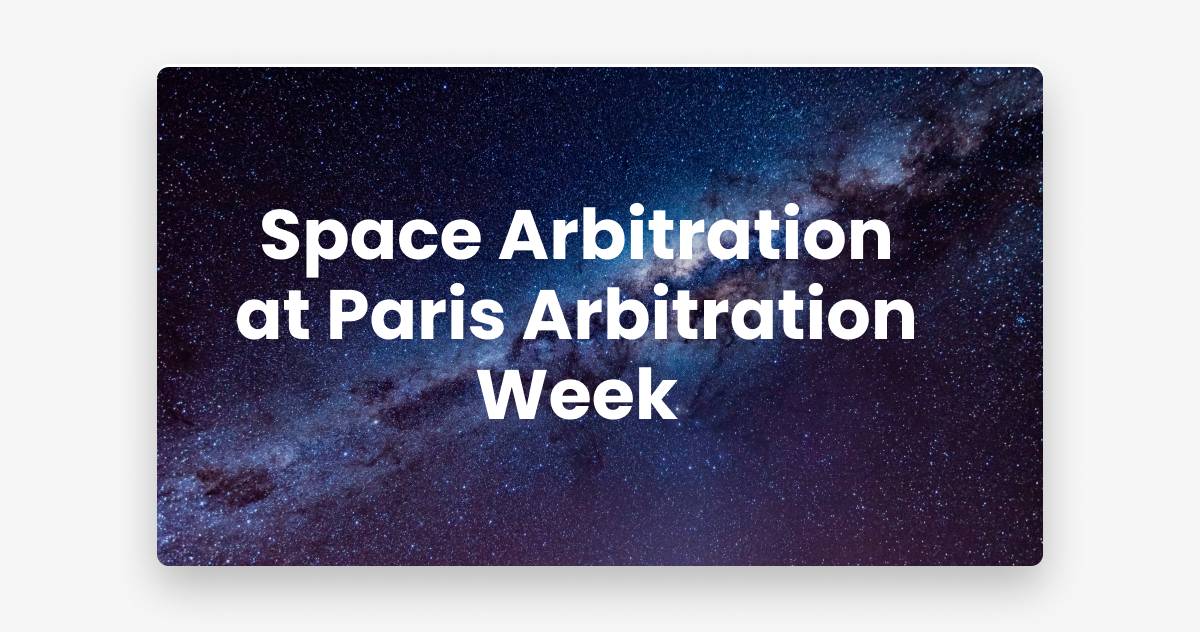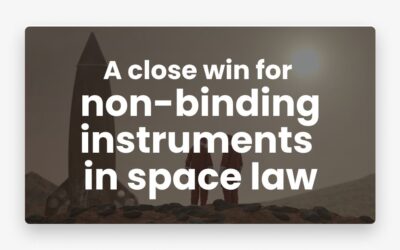Space Arbitration at Paris Arbitration Week
By Luca Erhart
In this post, Luca Erhart reports on a panel discussion at Paris Arbitration Week 2022 organized by the Space Arbitration Association and Holland & Knight.
On 29 March 2022, Holland & Knight and the Space Arbitration Association hosted a virtual panel discussion on “Space Arbitration: Disputes Over Satellites and More”, as part of the 2022 Paris Arbitration Week. The panel was moderated by Allison Torline (Counsel, Busse Disputes) and featured Dr. Jan Frohloff (Independent Practitioner), Laura Yvonne Zielinski (Holland & Knight), and Eden Jardine (Lalive).
Contractual Disputes Related to Outer Space
The discussion kicked off with the first speaker, Dr. Jan Frohloff, who provided an overview of commercial, contractual disputes related to outer space activities. He noted that such disputes do not – at this point – concern activities or settlements on the Moon or other celestial bodies. Rather, they are largely about traditional commercial space activities, such as satellites for telecommunications and earth observation. Contracts related to such activities usually cover the entire lifecycle of the satellites: from the sale-purchase of the satellites to their launch and subsequent operation. As a result, an arbitration is usually related to one of those three phases.
Dr. Jan Frohloff noted that these space contracts present three unique features. Firstly, they present counterintuitive contractual features, in particular in relation to the burden of risk. The space industry operates in a harsh environment with little room for error, and it is only rarely possible to remedy a deficient performance. A key issue thus becomes the determination of who bears the burden of risk. It is not uncommon for launch service agreements to include a clause which determines that the launcher fulfils his obligations with the launch of the launch vehicle. For this purpose, launch is very often defined as “intentional first stage engine ignition and lift off”. Hence, even if the rocket explodes only 10 seconds later, the launcher will have fulfilled his obligations. The risk that something goes wrong is thus usually the customer’s, who will have to decide whether to take that risk or to take up an insurance. By contrast, a less counterintuitive and common feature of space contracts is confidentiality. The space industry is secretive, and hence there is usually little to no information available on space arbitrations.
The second unique feature of space contracts (and the resulting arbitration) that Dr. Jan Frohloff pointed out were the politics involved. This is the result of the dual use to which satellites can be put (“dual-use goods”). Satellites are valuable commercial and strategic, military assets. As a result, space agencies of the State remain powerful players. Very often, although there is a commercial contract in place, a private party will effectively be dealing with the State (or its agencies). If that State decides the terms of the contract, chances of obtaining specific performance are low. According to Dr. Jan Frohloff, one recent example of the impact of politics on space activities is the refusal of ROSCOSMOS to launch a batch of satellites of the satellite operator OneWeb. The next batch of satellites was meant to launch in March 2022, a few days after the start of the Russia-Ukraine war. ROSCOSMOS communicated that the launch could only take place if OneWeb guaranteed that the satellites would not be put to military use and that the UK government divest its stake. No agreement has been reached and no satellites have been launched as a result.
The final unique feature Dr. Jan Frohloff highlighted were the legal issues beyond the realm of contracts. Space contracts are often subject to public law requirements. For example, to manufacture or sell satellites you need an export control permit, whereas to operate a satellite you need clearance from a regulator to place it in a certain orbit and use certain frequencies.
Dr. Jan Frohloff thus concluded that, although still confined to activities on Earth or in orbits surrounding it, commercial space arbitration does present unique features that distinguishes it from arbitration in other commercial sectors. Allison Torline then asked whether the applicable substantive law is also an issue for space arbitration, to which he responded that it is not because the contract will normally determine it. It can however become an issue where there is no contract prior to the dispute, and it is also relevant to the applicable public law requirements. Being asked about the Permanent Court of Arbitration’s Outer Space Arbitration Rules, he explained that those are meant to fill a gap of dispute resolution in international space law. Dr. Jan Frohloff added that the Rules were drafted with States in mind, and that there had not been any cases under the Rules yet – although there was confidence that they would eventually arise.
Disputes Arising from Satellite Collisions
The discussion then moved from contract to tort, with Laura Zielinski talking about disputes arising from satellite collisions. She started with recent developments in outer space activities, noting the large number of new satellites being launched. In 2010, there were around 950 operational satellites, in 2020 there were around 3.400, and in 2030 the number is predicted to be almost 100.000: a result of the planned launches of satellite constellations. This brings exciting possibilities (e.g., wildfire detections and global broadband coverage) but also poses unique challenges. Thus, she pointed out that the number of satellites being launched will congest the lower earth orbit and increases the risk of collisions – not only with active satellites but also with small pieces of space debris (= pieces of defunct satellites). Even without an actual collision this is already causing harm to space operators, who see a decrease in their satellites’ lifetime and revenues every time they move them because of the consumption of fuel from such a manoeuvre.
Laura Zielinski then turned to the substantive rules to address disputes from satellite collisions, noting that such rules are effectively non-existent. This is because at the time the Space Treaties were drafted and agreed to this was not a foreseeable problem. However, there are non-binding guidelines on Space Debris Mitigation and key stakeholders of the space industry are undertaking significant efforts to enact Space Traffic Management Rules. Moreover, the 1972 Liability Convention deals with the issue, attributing liability for harm caused by space objects. But it focuses exclusively on States and is thus not applicable to private space operators.
As for dispute resolution mechanisms, she noted that the 1972 Liability Convention creates the “Claims Commission”, a quasi-arbitral body, which is available to States – private operators would have to ask for diplomatic protection by their home States. She pointed out that there are alternatives, although many of them with flaws. Firstly, one possibility would be to turn to domestic courts. However, those face the issue of not having harmonized rules to apply, and applicants could face additional hurdles, such as immunities. Secondly, there is investment arbitration, which is however only available where the host State is the one causing the damage. This is difficult to prove in outer space, where many pieces of space debris are not trackable.
Laura Zielinski also highlighted two potential mechanisms that are not currently in place but could be used to resolve future disputes. Firstly, national States could include consent to arbitration as a requirement for providing launching licenses. Any space object launched would then be subject to an arbitration clause, so that in case of a collision there would be prior consent. Secondly, there is the possibility foreseen by Dr. Karl-Heinz Bockstiegel, who proposed a Draft Convention closely mirroring the Convention on the Law of the Sea. This Convention would then provide access for private parties to international arbitration as default mechanism for the settlement of disputes. The Draft Convention has however never gained sufficient political support.
Allison Torline followed up on the comments on the applicability of investment arbitration in outer space, Laura Zielinski explaining that there have so far not been any cases related to space collisions or avoidance manoeuvres. But there have been more conventional treaty cases, such as Devas v India and Deutsche Telekom v India, which arose out of India’s revocation of leased S-Band frequency rights.
Disputes Over Property Rights in Outer Space
To finish the panel discussion on space arbitration, Eden Jardine talked about the third and final kind of (future) outer space disputes, surrounding property rights in outer space as a result of space mining (= the exploration of minerals and resources in outer space). She explained that such disputes could be both contractual and non-contractual in nature. Contractual disputes could arise from sale and purchase, license, share-hold or other agreements, whereas non-contractual disputes usually relate to property or ownership disputes.
Eden Jardine highlighted that there exists controversy regarding the (interpretation of the) legal framework of space mining. Thus, on the one hand, the 1967 Outer Space Treaty appears to designate outer space as a public property, subject to the non-appropriation principle contained in article 2. The Moon Agreement (not widely ratified) also refers to the equitable sharing of lunar resources. On the other hand, at the domestic level, the United States have passed an Act in 2015 which enables citizens to obtain their own asteroids, mine them and keep what they find. Other countries have adopted similar legislation (see e.g., Luxembourg, 2017; or Japan, 2021). Moreover, there are the Artemis Accords, a non-binding international agreement, which similarly supports the private exploitation of outer space resources and minerals.
Eden Jardine then turned to the intersection between space mining and international arbitration, in particular, to the question of why arbitration may be appropriate to resolve disputes in this area. Amongst the reasons she identified were that these disputes were likely to be similar to mining disputes on Earth and will likely involve cross-border (international companies, assets, and projects), multi-parties and/or multi-contractual elements. They will similarly need arbitrators with industry-specific knowledge and there will be the need for global enforcement. Moving on, how can the arbitration community prepare to service space mining disputes? Eden Jardine identified three ways: (1) increasing knowledge of space law, mining, and arbitration law of relevant stakeholders; (2) holding consultations with interested stakeholders (such as, miners or technology/space companies); and (3) establishing an international space arbitration court. As for the last suggestion, she noted that the internal structure of this court could be divided into a general chamber that deals with all commercial issues and specialized chamber that deal only with certain issues (investments, space debris, etc.) to cater specific needs.
Allison Torline then asked her about whether she believed the current legislative framework to be adequate to which Eden Jardine repeated that there exist (or, at least, many think there exist) inconsistencies between international and domestic laws on space mining. In her view there exists the need for an international law reform to ensure that all countries are on an even playing field. To the follow-up question of how the international community could fill the gaps in the current legislative framework, Eden Jardine opined that this could be done by establishing a binding, uniform outer space mining treaty/law. To achieve this, one can draw on existing investment treaties as well as the New York Convention, which should guide the reforming process.
For those interested in space mining disputes, the Space Arbitration Association has recently published a post on this topic here.
The ITU, Space Sustainability, New Conventions and Liability
Towards the end of this session on Space Arbitration at Paris Arbitration Week, Allison Torline raised several selected questions that had been brought up by members of the public throughout the event. Firstly, on whether the International Telecommunications Union was involved with the allocation of frequencies and bandwidth in outer space, Dr. Jan Frohloff commented that it is involved although States act as intermediaries: frequency bands and geostationary orbit slots are assigned by the ITU to States, who can then allocate them to private companies according to their national regulations. Secondly, Laura Zielinski was asked about how space safety/sustainability is best regulated. She thought that this is best done via the UN COPUOS Legal Committee. Another solution would be through domestic laws, but the issue is best dealt with at the international level.
The panelists were then asked to predict whether a new international convention regulating activities and disputes will be negotiated soon. Dr. Jan Frohloff noted that with the current geo-political situation this is unlikely. Instead, he thought that there would be many more developments in mining, space activities and disputes before such a convention is created. Laura Zielinski also noted that the 1967 Outer Space Treaty is also not completely obsolete, containing many general principles that are still useful today. And Eden Jardine added, such principles can then be elaborated upon by non-binding agreements, such as the Artemis Accords, which can eventually attain binding status. Finally, to the question of where liability stands in today’s real cases, Laura Zielinski explained that the Liability Convention has two different liability regimes: (1) absolute liability for damage caused by space objects on earth (where little exoneration is possible); and (2) fault-based liability for damage in outer space. Non-binding instruments, such as debris mitigation guidelines, might inform the notion of fault.
You might also like
Investment Protection and Space Investors
Investment Protection and Space Investors By Luca Erhart and Riccardo LoschiInvestment Protection...
A close win for non-binding instruments in space law
A close win for non-binding instruments in space law By Ruvimbo Samanga"A close win for...
Space Arbitration: Protecting Space Investments
Space Arbitration: Protecting Space Investments By Katie MakSpace Arbitration: Protecting Space...


